British jihadis are being killed in the conflict in Syria and Iraq at a rate of over one every three weeks, according to the most thorough documentation of the death toll to date.
Overall, 23 Britons are believed to have died after travelling to fight in the bloody civil war, says King’s College London’s International Centre for the Study of Radicalisation (ICSR). ICSR’s figures were updated following Tuesday’s revelation that Mamanour Roshid, 24, had become the third man from Portsmouth to have been killed in Syria.
Roshid was part of a group of five Bengali men who travelled from the port city in October 2013 to join Ifthekar Jaman, 23, also from Portsmouth, who died a few months later. Another of the Portsmouth jihadis, Muhammad Hamidur Rahman, 25, was reported killed in July.
Since the start of 2014 alone, 16 UK fighters have died, the academics believe, meaning approximately three British jihadis are dying every two months in a war zone that spreads from the Mediterranean coast to central Iraq, and north to Kurdish controlled areas on the Turkish border.
Because of the confused information emerging from the war zone, each casualty and death has been verified as completely as possible. In most of the 23 cases, families themselves have reported their child as dead – confirming their real names alongside those used on social media – and have spoken publicly about their child’s lives. In some cases the Guardian has also directly contacted families to confirm the deaths.
In only five cases has the thinktank heavily relied on reports from other verified participants in the conflict, without accompanying photos or “martyrdom” videos, to catalogue the death. In all those cases the fighters were previously tracked in some way on social media by ICSR before accounts suddenly went silent.
From what is known about the 23, they are all second-generation immigrants from a variety of ethnic backgrounds including Libyan, Palestinian, Eritrean and Bangladeshi. Their average age was 23.5, with the oldest being Crawley father Abdul Waheed Majeed, 41, who blew himself up driving a truck bomb during a prison break in February. The youngest, Abdullah Deghayes, from Brighton, and one fighter using the name Abu Hamza Bengali, were both 18.
While three of the dead were from Portsmouth, two have come from Brighton, and five are from north and west London.
Agreeing with many experts in the field, renowned behavioural economist Cass Sunstein said that for most extremists poverty or a lack of educational prospects were not obvious motivating factors.
Many of the 23 dead appear to have had well-paying jobs such as driving an HGV for the Highways Agency, or working for north London estate agents, and at least five of those in ICSR’s database were enrolled in, or had completed, higher education. However, Choukri Ellekhlifi, 22, and Mohammed el-Araj, 23, both from west London, had significant criminal records and had spent time in prison.
ICSR’s Shiraz Maher said most of the British dead had much better prospects than other jihadis from Europe known to have been killed. “These people come from every background imaginable but when you compare Brits to other Europeans, it’s clear that those from this country tend to be better educated, more affluent, and have greater social mobility than their peers on the continent.”
Maher said the true total of British dead could be much higher. ICSR, which has been tracking foreign fighters since mid 2013 was aware of others who had been reported dead but could not be substantially verified, while other deaths may have evaded their monitoring altogether.
“We think it’s incredibly likely that others have died that we’ve not heard of. In some of these cases, we found out by pure chance,” he said.
Although the majority of British fighters have joined Isis, those catalogued as killed have fought for a range of Syrian fighting groups including al-Qaida offshoot Jahbat al-Nusra, Jund al-Aqsa, and Katiba al-Muhajireen (the battalion of migrants) a militia which includes many Chechen and Russian fighters and hundreds of other foreign fighters.
Most of the 23 are known to have died fighting against soldiers loyal to Syrian president Bashar al-Assad’s government, but four are understood to have been killed in infighting between anti-Assad groups, three in battles against Kurdish militias on the Turkish border, and Abdul Raqib Amin from Scotland is understood to have died battling Iraqi forces in Ramadi.
The earliest known death is that of Ibrahim Mazwagi in February 2013. More recently, three Bangladeshis from east London are understood to have died alongside Brighton teenager Ibrahim Kamara in a US drone strike in western Syria’s Aleppo province this September.
In recent months verification has become harder. Earlier in the conflict many dead fighters were eulogised as anti-Assad “heroes” in pictures or in videos, but this practice appears to have tailed off. One fighter told the Guardian of fears that revealing the names of those who had died would make it easier for police and media to harass grieving families back in the UK.
Speaking at a national security conference on Tuesday, Britain’s most senior police officer, Sir Bernard Hogan-Howe, said up to five British jihadis were joining armed groups every week. “We know that over 500 British nationals travelled to join the conflict. Many have returned and many will wish to do so in the coming months and perhaps in future years,” Hogan-Howe said, adding that the number of returnees from the civil war were pushing up the number of potential plots and terrorist arrests the police were making.
The Met say they have made 218 arrests for terrorist-related activity this year, an increase of about 70% in three years. “A large part of this increased arrest rate is due to terrorist activities, plots and planning linked to Syria. The trend is, I think, set to continue,” Hogan-Howe said.
Additional reporting by Jane Denton
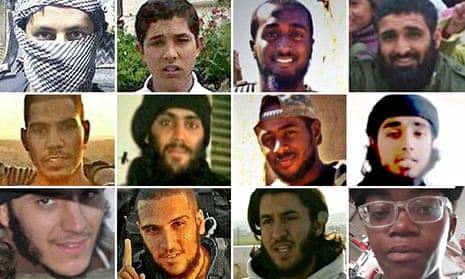
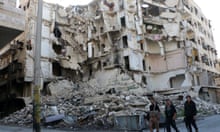


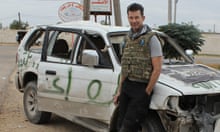
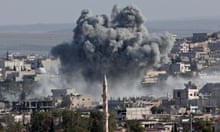

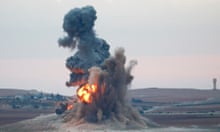

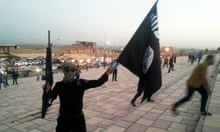

Comments (…)
Sign in or create your Guardian account to join the discussion